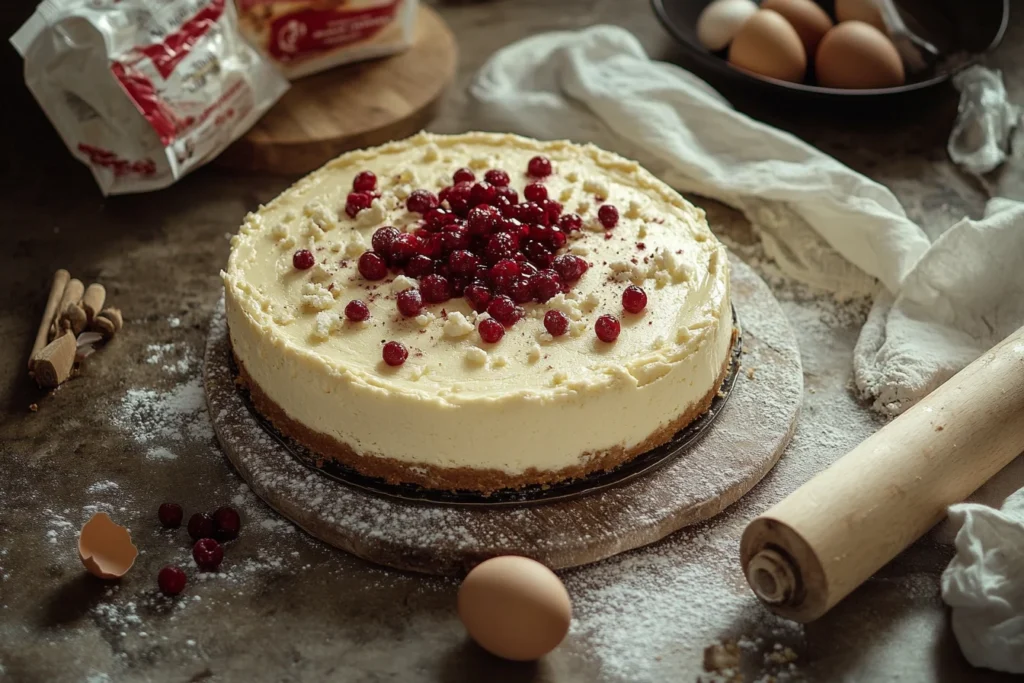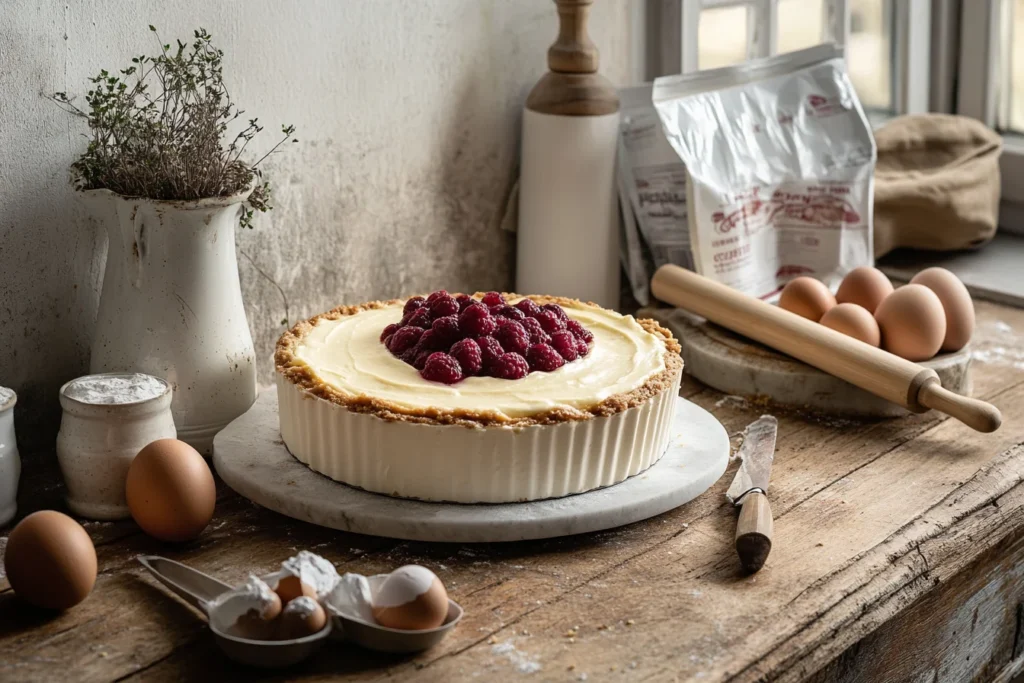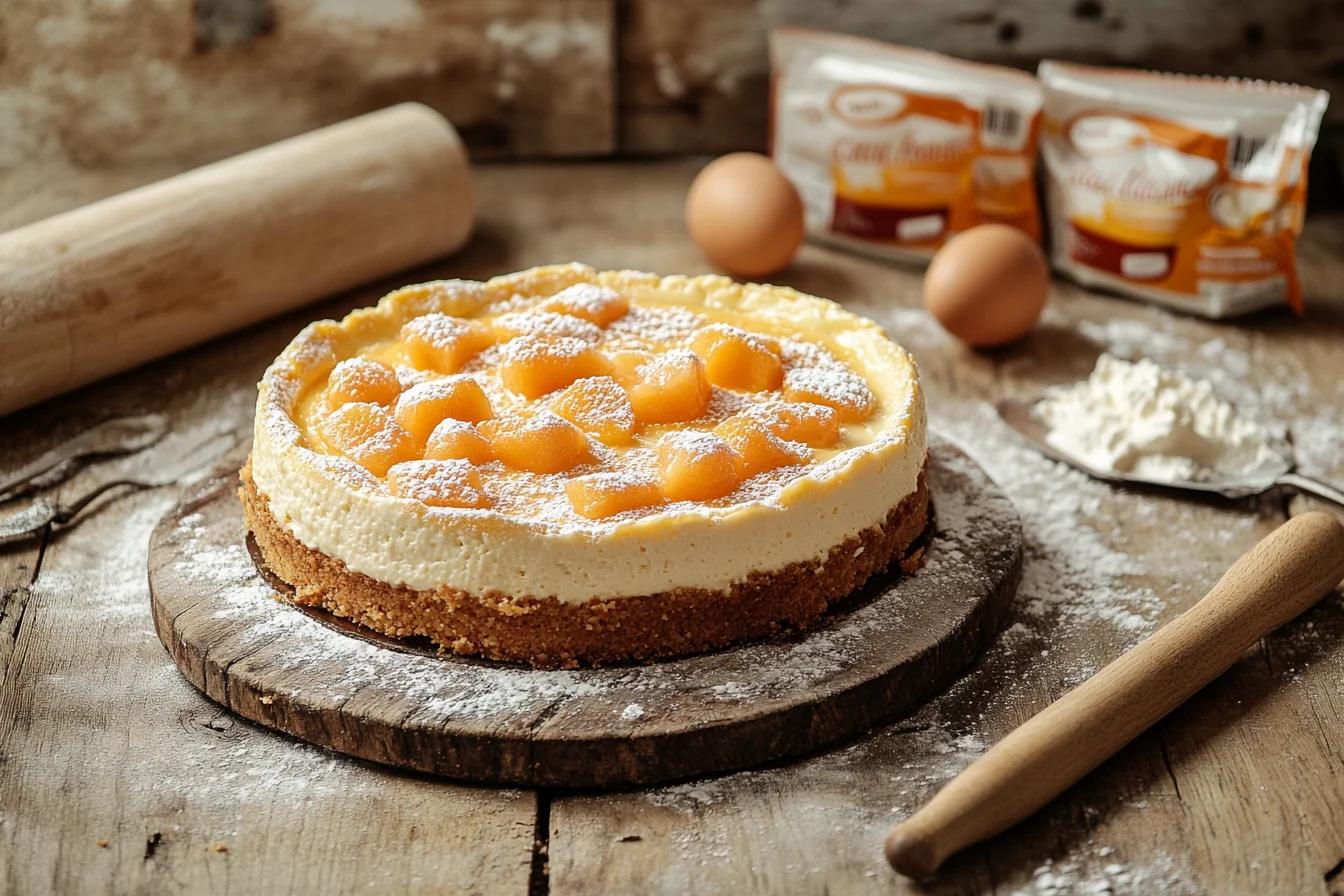Table of Contents
Introduction to the Cost Debate
Is It Cheaper to Make or Buy Cheesecake? A Cost Comparison, Cheesecake is a timeless dessert, but it often comes with a hefty price tag. This raises a common question among dessert lovers: Is it cheaper to make cheesecake or buy it? The answer depends on several factors, including the cost of ingredients, time, effort, and the quality of the final product. In this guide, we’ll break down the costs and considerations to help you decide whether baking or buying cheesecake is the better option.
This raises a common question among cheesecake enthusiasts: is it cheaper to make cheesecake at home or simply buy it from a store or bakery? The answer isn’t straightforward, as it depends on various factors such as the cost of ingredients, time and effort involved, and the quality of the cheesecake.
In this article, we’ll explore these factors in detail. By comparing the expenses, challenges, and benefits of homemade versus store-bought cheesecake, we aim to provide a comprehensive guide to help you make an informed decision. Let’s dive in and settle the cheesecake cost debate once and for all.
For those interested in exploring the broader cheesecake landscape, check out this guide to choosing between baked and unbaked cheesecakes.
Understanding the Cheesecake Market

The cheesecake market is as diverse as the dessert itself, with prices varying widely depending on where and how you purchase it. From grocery store shelves to upscale bakeries, and even ready-to-order online options, the cost of a cheesecake can range significantly based on factors like size, brand, and quality.
Cheesecakes from Grocery Stores
Grocery stores often offer a variety of pre-made cheesecakes in their bakery sections. These can range from simple, single-flavor options to more elaborate versions featuring toppings like fruit, chocolate, or caramel. Prices for these typically fall between $10 to $20 for a standard 9-inch cheesecake, though this can vary depending on location and brand.
Specialty and Bakery Cheesecakes
When purchased from a dedicated bakery or a brand like The Cheesecake Factory, the price of cheesecake increases significantly. A single slice might cost anywhere from $5 to $8, while a whole cheesecake can range from $40 to $70 or more. The premium pricing reflects the use of high-quality ingredients, professional techniques, and the brand’s reputation.
Online Cheesecake Orders
Many companies now offer cheesecakes for online ordering, often with delivery directly to your door. While convenient, this option comes with additional costs, including shipping fees and premium packaging. Prices for these cheesecakes often start at $50 and can exceed $100 for specialty or gourmet versions.
Cost Variations by Type and Flavor
The type of cheesecake also influences the cost. A basic New York-style cheesecake is generally less expensive than a more intricate option like a tiramisu or red velvet cheesecake. Seasonal or limited-edition flavors may also come with higher price tags due to the novelty factor.
Understanding these pricing dynamics provides a foundation for comparing the cost of buying cheesecake to making it at home. Each option has its unique pros and cons, which we’ll explore in the next sections.
If you’re looking for desserts to pair with cheesecake, consider the versatile pumpkin banana loaf as a complementary treat.
Breaking Down the Cost of Homemade Cheesecake
Making cheesecake at home offers the opportunity to control every aspect of the dessert, from the quality of ingredients to the customization of flavors. However, understanding the cost of homemade cheesecake requires a detailed breakdown of the expenses involved.
For example, flavor inspirations like the spiced richness in Earl Grey cookies can elevate your cheesecake with minimal added expense.
Ingredient Costs
The core ingredients for a standard cheesecake include:
- Cream cheese: Typically $2–$3 per 8-ounce block (most recipes require 3–4 blocks).
- Sugar: Around $0.50 for the quantity needed in a single cheesecake.
- Eggs: $0.20–$0.40 each, depending on the brand and region (3–4 eggs are standard).
- Heavy cream or sour cream: About $2–$3 for a small container.
- Crust materials (e.g., graham crackers or digestive biscuits): $2–$4, plus $1–$2 for butter.
These basic ingredients alone total around $10–$15 for a standard 9-inch cheesecake. Specialty ingredients like vanilla beans, premium chocolate, or fruit toppings can add $5–$10 or more, depending on the recipe.
Utility and Equipment Costs
While the ingredients are a significant portion of the cost, the use of utilities and kitchen equipment also plays a role:
- Electricity or gas: Operating an oven for an hour can cost $0.10–$0.30, depending on local energy rates.
- Tools: If you don’t already own items like a springform pan ($10–$20) or an electric mixer ($30–$50), these initial investments can increase the cost of making cheesecake at home.
Homemade Cheesecake Variations
The cost of homemade cheesecake varies depending on the type:
- Basic cheesecake: $10–$15 (e.g., plain New York-style).
- Premium cheesecake: $15–$25 (e.g., chocolate swirl, fruit compote toppings).
- Specialty cheesecake: $25–$40 (e.g., gluten-free, vegan, or gourmet options requiring niche ingredients).
Comparison to Store-Bought Costs
When comparing the base cost of $10–$15 for a homemade cheesecake to the $40–$70 price tag of a bakery cheesecake, the homemade option appears much more economical. However, time, effort, and initial equipment costs should also be factored into the decision.
Analyzing the Cost of Buying Cheesecake
Purchasing a cheesecake from a store, bakery, or online retailer is the epitome of convenience, but it often comes at a higher financial cost. To determine whether buying is the better option, it’s essential to break down the associated expenses.
Grocery Store Cheesecakes
Cheesecakes sold at grocery stores are typically mass-produced, which keeps their prices relatively low.
- Average Cost: $10–$20 for a 9-inch cheesecake.
- Pros: These cheesecakes are widely available and reasonably priced. They are ideal for casual occasions or last-minute desserts.
- Cons: The quality and flavor can vary significantly, with some tasting overly processed or too sweet.
Bakery and Specialty Cheesecakes
Cheesecakes purchased from bakeries or specialty shops are often handcrafted with premium ingredients, which significantly increases their price.
- Average Cost: $40–$70 for a 9-inch cheesecake; individual slices typically range from $5 to $8.
- Pros: The quality is often superior, with fresh ingredients and complex flavors.
- Cons: The price may be prohibitive for casual consumption, and availability can be limited based on location.
Online Cheesecake Retailers
Online platforms like Goldbelly and direct bakery websites offer nationwide delivery of gourmet cheesecakes.
- Average Cost: $50–$100 for a cheesecake, with additional shipping fees ranging from $10 to $30.
- Pros: This option provides access to renowned bakeries and unique flavors not available locally.
- Cons: The cost is significantly higher due to shipping and premium branding, making this a luxury option.
Case Study: Grocery vs. Bakery vs. Homemade
Let’s compare the cost of a basic New York-style cheesecake across options:
- Homemade: $10–$15 for ingredients.
- Grocery Store: $12–$18 for a pre-made cheesecake.
- Bakery: $40–$60, depending on the brand and location.
The price disparity highlights that homemade cheesecakes are the most budget-friendly option, followed by grocery store versions, with bakery cheesecakes being the most expensive.
Hidden Costs of Buying Cheesecake
While buying cheesecake appears convenient, additional costs such as transportation, delivery fees, or extra charges for customization can make this option more expensive than initially anticipated.
In conclusion, while purchasing a cheesecake offers convenience, it is typically more expensive than making one at home, especially for those who bake frequently or already own the necessary equipment.
Time and Effort: Home Baking vs. Buying

Beyond monetary costs, time and effort play crucial roles in deciding whether to make or buy cheesecake. Both options have distinct advantages and challenges, depending on the individual’s priorities and resources.
Time Required for Homemade Cheesecake
Making a cheesecake from scratch is a multi-step process that involves:
- Preparation: Gathering ingredients, mixing the filling, and preparing the crust (20–30 minutes).
- Baking (if applicable): Depending on the recipe, baking can take 1–1.5 hours, followed by gradual cooling to avoid cracks.
- Setting Time: Cheesecakes, both baked and unbaked, typically require refrigeration for 4–8 hours or overnight.
Overall, the process from start to finish can take up to 10 hours, though most of this time is inactive (cooling and setting). However, the hands-on effort is usually limited to about 1–2 hours.
Convenience of Buying Cheesecake
Purchasing cheesecake is undeniably more convenient:
- Grocery Stores: Cheesecake is available pre-packaged and ready to eat. A simple trip to the store or online order can save hours of preparation.
- Bakeries and Online Orders: These options offer high-quality cheesecakes with minimal effort required. Delivery services can even eliminate the need to leave home.
Skill Level and Challenges of Baking
Making cheesecake requires some baking skills, particularly for baked versions where temperature control and proper mixing techniques are critical. Common challenges include:
- Achieving a smooth, crack-free surface.
- Ensuring the correct consistency for the filling.
- Balancing flavors and textures.
For beginners, these challenges may result in trial and error, increasing both the time and cost of homemade cheesecakes. However, for experienced bakers, the process can be a fun and rewarding project.
Trade-Offs
- Homemade Cheesecake: Offers customization and control over ingredients but demands time and effort.
- Store-Bought Cheesecake: Provides instant gratification and convenience but sacrifices the personal touch and often costs more.
In summary, choosing between making and buying cheesecake depends on whether you value the satisfaction of baking and customizing your dessert or the time-saving convenience of a pre-made option.
Quality and Customization
When deciding whether to make or buy cheesecake, quality and customization are key considerations. Homemade and store-bought cheesecakes each have distinct advantages and limitations in these areas.
Quality of Homemade Cheesecake
Making cheesecake at home allows complete control over the quality of ingredients. You can choose:
- Fresh Ingredients: Opt for high-quality cream cheese, organic eggs, and fresh fruit toppings.
- Customizable Sweetness: Adjust the sugar level to suit your taste or dietary needs.
- Dietary Considerations: Create gluten-free, low-sugar, or dairy-free versions using alternative ingredients.
Homemade cheesecakes often have a fresher taste compared to store-bought options, which may contain preservatives to extend shelf life.
Quality of Store-Bought Cheesecake
While bakery and specialty cheesecakes are known for their premium ingredients, mass-produced grocery store cheesecakes often prioritize affordability over quality. These products may include:
- Preservatives: To maintain texture and flavor during transportation and storage.
- Artificial Flavors: Used to replicate natural ingredients at a lower cost.
High-end bakery cheesecakes, on the other hand, often use top-tier ingredients, rivaling or even exceeding the quality of homemade versions. However, this comes at a significant price.
Customization of Homemade Cheesecake
Homemade cheesecake offers unparalleled opportunities for customization:
- Flavors: Add unique twists, such as matcha, salted caramel, or tropical fruits.
- Size: Make individual portions, mini cheesecakes, or large, family-sized versions.
- Presentation: Experiment with decorative toppings, swirls, or layered designs.
Limitations of Store-Bought Cheesecake
Store-bought cheesecakes typically come in standard sizes and flavors, limiting personalization. While some bakeries allow custom orders, these are often more expensive and may require advance planning.
Special Considerations for Dietary Needs
For individuals with dietary restrictions, homemade cheesecake is usually the better choice. It allows bakers to substitute ingredients like almond flour for gluten-free crusts or coconut milk for dairy-free options. Store-bought alternatives may offer limited choices in this regard.
In conclusion, if quality and customization are priorities, making cheesecake at home is often the superior choice. However, store-bought cheesecakes can still deliver convenience and premium quality, especially when sourced from reputable bakeries.
Survey Data and Consumer Preferences
Understanding consumer preferences can shed light on the debate about whether it’s cheaper—or more satisfying—to make cheesecake at home or buy it. Surveys and anecdotal evidence reveal interesting trends in how people perceive the cost, effort, and quality of each option.
Survey Insights on Cheesecake Preferences
- Cost Considerations:
According to surveys conducted by food blogs and forums, about 60% of respondents believe that making cheesecake at home is more cost-effective. Many participants highlighted the affordability of basic ingredients compared to the high prices of bakery and specialty cheesecakes. - Convenience Preferences:
Convenience was a major factor for consumers preferring store-bought cheesecakes. Over 50% of respondents noted that they value the time saved by purchasing pre-made cheesecakes, especially for special occasions or last-minute needs. - Quality and Taste:
Interestingly, opinions were divided on quality. Around 70% of survey participants who bake regularly claimed that homemade cheesecakes tasted fresher and had a superior texture. However, fans of bakery cheesecakes argued that the professional touch often results in a more refined product.
Anecdotal Evidence from Cheesecake Enthusiasts
Many cheesecake enthusiasts shared personal anecdotes about the satisfaction of baking their own cheesecake. Common sentiments included:
- The Joy of Baking: “Baking a cheesecake from scratch makes it feel special. It’s worth the effort, and I know exactly what goes into it.”
- Convenience and Consistency: “I prefer buying from my favorite bakery because it’s reliable, and I don’t have to worry about messing up.”
Factors Influencing Preferences
- Special Occasions: Store-bought cheesecakes are often preferred for large gatherings due to their convenience.
- Dietary Restrictions: Homemade cheesecakes are the go-to option for individuals with specific dietary needs or preferences.
- Skill Level: Novice bakers may feel intimidated by the complexity of cheesecake recipes, making store-bought options more appealing.
Summary of Consumer Insights
While homemade cheesecakes are celebrated for their cost-effectiveness, customization, and freshness, store-bought options are preferred for their convenience and consistent quality. These findings underscore that the choice often depends on individual priorities, including budget, time, and skill level.
The Role of Special Occasions
Special occasions often play a pivotal role in the decision to make or buy cheesecake. Factors like the size of the gathering, available time, and the significance of the event can influence this choice.
When Buying Cheesecake Makes Sense
- Large Gatherings:
For events like weddings, corporate parties, or large family reunions, purchasing cheesecake from a bakery is often the practical choice. It ensures consistency in quality and presentation while saving significant time and effort.- Example: A professionally decorated cheesecake can double as a centerpiece for formal occasions.
- Last-Minute Needs:
Store-bought cheesecakes are ideal for last-minute celebrations or when time is tight. With options readily available in grocery stores or online, they provide a quick solution without compromising on flavor. - Cost vs. Effort for Larger Quantities:
Buying cheesecake in bulk often becomes more economical than baking multiple large cheesecakes at home, especially when factoring in time and energy costs.
Why Homemade Cheesecake is Preferred for Intimate Events
- Personal Touch:
Homemade cheesecake adds a unique, personal element to smaller gatherings like birthdays, anniversaries, or dinner parties. Guests often appreciate the effort and thought behind a dessert made from scratch.- Example: A customized cheesecake with flavors tailored to the guest of honor can leave a lasting impression.
- Customization for Dietary Needs:
For intimate events, it’s easier to accommodate dietary restrictions or preferences through homemade cheesecake. Bakers can create gluten-free, sugar-free, or vegan variations as needed. - Memories and Experience:
Baking cheesecake for a loved one can become a cherished memory. The process itself often becomes part of the celebration, creating a more meaningful experience.
Balancing Cost and Effort for Special Occasions
The decision to make or buy cheesecake for special occasions often boils down to weighing cost against convenience and personal significance. While buying may offer simplicity, making cheesecake at home can elevate the emotional value of the event.
FAQs Based on “People Also Ask”
Is it cheaper to make cheesecake from scratch?
Yes, making cheesecake from scratch is generally cheaper than buying it from a bakery or specialty shop. The base ingredients for a homemade cheesecake typically cost $10–$15, whereas store-bought or bakery cheesecakes can range from $20 to $70 or more. However, the cost advantage may diminish if you need to invest in equipment like a springform pan.
What is the average cost of a homemade cheesecake?
The average cost of a homemade cheesecake varies depending on the type and quality of ingredients. A basic New York-style cheesecake costs around $10–$15, while specialty variations with premium ingredients, like mascarpone or fresh fruit toppings, can range from $20 to $30.
Are homemade cheesecakes healthier than store-bought?
Homemade cheesecakes can be healthier because you control the ingredients, avoiding preservatives, artificial flavors, and excessive sugar. You can also customize recipes to fit dietary needs, such as using low-fat cream cheese or natural sweeteners.
Can I make cheesecake without special tools?
Yes, it’s possible to make cheesecake without special tools, but certain items, like a springform pan or electric mixer, can make the process easier. If you don’t have a springform pan, you can use a pie dish, though removing the cheesecake might be more challenging.
How do ingredient substitutions affect the cost of homemade cheesecake?
Substituting ingredients can affect the cost. For example, using mascarpone instead of cream cheese can increase the expense, while opting for store-brand ingredients may reduce it. Dietary substitutes, like almond flour for a gluten-free crust, may also raise costs due to their premium pricing.
Is buying cheesecake worth the extra cost?
For those prioritizing convenience and consistent quality, buying cheesecake can be worth the extra cost, especially for special occasions or when time is limited. However, if budget and customization are more important, homemade cheesecake is a better choice.
Final Verdict: Make or Buy?
The question of whether it’s cheaper to make cheesecake or buy it depends on a variety of factors, including cost, time, effort, and personal preferences. Here’s a summary of the key takeaways to help you decide:
Cost
- Homemade Cheesecake: Typically costs $10–$15 for basic recipes and up to $30 for specialty versions. It’s the more economical choice, especially for those who already have the necessary tools and enjoy baking.
- Store-Bought Cheesecake: Prices range from $20 for grocery store options to $70 or more for premium bakery versions. Convenience and consistent quality come at a higher price.
Time and Effort
- Homemade Cheesecake: Requires several hours of preparation, baking (if applicable), and chilling. While the hands-on time is manageable, the overall process can be lengthy.
- Store-Bought Cheesecake: Saves significant time and effort, making it ideal for last-minute needs or when baking isn’t an option.
Quality and Customization
- Homemade Cheesecake: Allows for complete control over ingredients, flavors, and dietary accommodations. It’s perfect for those who enjoy experimenting and tailoring desserts to specific preferences.
- Store-Bought Cheesecake: Offers convenience but is limited in terms of customization. High-end bakery options, however, often deliver exceptional quality.
Special Occasions
- Buying cheesecake is a practical choice for large events or when time constraints are a concern.
- Homemade cheesecake adds a personal, meaningful touch to intimate gatherings and allows for creative expression.
Conclusion
If cost and customization are your primary considerations, making cheesecake at home is the clear winner. It’s the more affordable option and gives you the flexibility to create a dessert that suits your exact needs. On the other hand, for those who value convenience and are willing to pay a premium for quality, store-bought cheesecake is an excellent alternative.
Ultimately, the decision comes down to your priorities. Whether you choose to bake or buy, cheesecake is a timeless treat that’s sure to delight, no matter how it’s made.
Explore more about the nuances of cheesecake-making with this detailed guide to strawberry cheesecake ingredients and preparation.


6 thoughts on “Is It Cheaper to Make or Buy Cheesecake? A Cost Comparison”